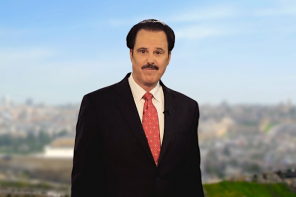May 11 was your day for a miracle.
Didn’t get the memo? You haven’t been watching God TV.
The appointed day was Pentecost Sunday, and the place was Jerusalem, where God TV, a Christian network first launched in England in 1997, moved its headquarters in 2002. Broadcasting from Jerusalem, say Rory and Wendy Alec, God TV’s founders, is a fulfillment of a prophecy, just like the founding of the Israeli state. The May 11 appointment with God brought a supernatural realization of His promises to you. Just send in your petition to Rory and Wendy, and they will place it at the altar in Jerusalem. And then let the miracles begin.
If this seems strangely, elusively, and creepily enticing, welcome to the world of an apostolic movement sweeping the globe with its claims of prophecy direct from God, supernatural revivals and healings, and a quest to mold young people for God’s kingdom by enforced sexual purity, 24/7 prayer, repentance, and fasting. God TV, which acts both as a player in the movement and its gigantic PR machine, beams its programming (which often includes live prayer and revival events from the apostolic movement) across Europe, Asia, and Africa. And although God TV can only be seen in the United States on the satellite provider DirecTV or the Internet, the network is notable here not because of the audience it reaches, but because of the growing movement it depicts.
Like its most well-known rival, the US-based Trinity Broadcasting Network (TBN), God TV broadcasts the programming of the popular Word of Faith, or prosperity gospel, televangelists like Benny Hinn, Joyce Meyer, John Hagee, and Kenneth Copeland. But unlike TBN, God TV offers broadcasts of prophetic revival conferences from around the world, featuring names not familiar to secular—or even many Christian—audiences, but well-known to followers of this apostolic movement. Found occasionally on TBN, and often in the pages of the flagship publication of the charismatic evangelical movement, Stephen Strang’s Charisma, these self-anointed apostles and prophets like Mike Bickle, Lou Engle, and Cindy Jacobs, to name a few, all claim to be bringing revival to America and the world, to be creating a kingdom of purity and devotion to Christ in anticipation of his return. (The distinctions between pre- and post-millennial dispensationalism—which, respectively, foresee the arrival of Christ’s kingdom after his return and require attainment of Christ’s kingdom in order for him to return—are frequently blurred on God TV.)
The Alecs are operating in a radically different technological world from the one that Paul and Jan Crouch, the founders of TBN, ventured into in the early 1970s. While TBN, which now boasts assets in excess of $300 million, got its start by buying up individual broadcast stations eventually expanding into the new technologies of cable and satellite, God TV hit the airwaves worldwide much more quickly because the satellite technology was already in place. What’s more, the Alecs could tap into an existing market for their product, thanks in large part to the audience created by the Crouches. And, due to the couple’s (highly controversial) success at keeping the money flowing to TBN’s coffers and those of their televangelists, the Crouches bequeathed to the Alecs the Word of Faith template for non-profit televangelism fundraising: sow a seed into the network, and supernatural abundance awaits you.
Wendy, author of several “prophetic” fiction and non-fiction books, including one published by a Strang imprint, has defined herself as an evangelist and a prophet. Both Crouches are lifelong Pentecostals, raised in the Assemblies of God and the revivalism of the 1950s. But Wendy Alec thrives on telling of her conversion from debauchery to Christ when she was a teenage rock rebel in Durban, South Africa. (Rory is South African; Wendy was born in the U.K. but also raised in South Africa.) First introduced to Christianity at a Billy Graham Crusade, Wendy claims to have come face to face with Jesus while performing with her rock band at a Durban night club. “A few days after her Damascus Road conversion,” reads her biography on the web site for her book, Journal of the Unknown Prophet, “Wendy received this prophetic word: ‘And you shall be raised up as a forerunner of creative evangelism in this generation.’ The Prophetic Call to the Media was ignited.”
Unlike their forebears at TBN, the Alecs are updated and hip, reflecting the trend in charismatic youth evangelism to be more Avril Lavigne than Aimee Semple McPherson, more Justin Timberlake than Billy Sunday—completely de-sexed, of course. TBN’s Jan Crouch drew her stylistic cues from the big hair, big false eyelashes school of her old friend Tammy Faye Bakker, while Wendy’s hair mimics Jennifer Aniston’s. In a 2005 listing of emerging charismatic evangelical leaders under 40, Charisma’s editor, J. Lee Grady, who has been critical of the financial excesses and abuses of the Word of Faith movement, took a little dig at TBN when he wrote that the Alecs, “produce programs that are hip and sophisticated for younger viewers who can’t stomach most other religious programming. Unless other broadcasters figure out a way to reconnect with younger viewers, it is likely that God TV’s debut in the United States will send channel surfers in the Alecs’ direction.”
Recently God TV has been broadcasting live a healing revival of the Canadian evangelist Todd Bentley, from Lakeland, Florida, which Charisma dubbed the “Lakeland Healing Outpouring.” During the revival, which has been ongoing for more than a month, Wendy Alec claimed to have received a prophecy from God that “THIS is just the warm-up party—for what you shall see in the coming days shall even make these days pale—with what I have up my sleeve.” Alec also claimed a few weeks ago that Jesus told her back in 2004 that even though “Satan has been trying to forward the end timeline of the destruction of the entire East Coast of America,” his plans could be thwarted through “enough radical prayer.” She predicted that such a huge revival was coming to the east coast of the United States and that in “less than a decade the East Coast will be called America’s Bible Belt.” She is not, in other words, deterred by pursuit of the impossible.
In fact, it is the impossible that keeps the movement going—after all, one’s quest for purity, in realms spiritual and otherwise, is always an exercise in futility. So there’s always something to do, to pray for, to fast over, to repent for, and to ask for money for. All of that aspiration—and the money funding the revivals that are supposedly needed to win more souls to the chaste life of devotion to a puritanical Christ—provides the fuel that keeps God TV going.
For the Alecs, the evils of the secular world provide plenty of ammunition. Through a prayer revival in Great Britain, Alec claims God told her, “the stupor and the slumber and the secular humanistic spirits that have bound My people in this nation shall start to uproot.” In early 2007, she claimed that God told her He was preparing, “to pour out from heaven the ferocious fire of my spirit” on the West Coast of America—a “fresh new breath upon California” and not, Alec insisted, a mere repeat of the 1906 Azusa Street Revival. She said God promised a “cleansing” of Los Angeles and its “gatekeepers of the media and the entertainment industry.” And she warned the city of San Francisco, “overwhelm[ed]” by “the weight of sin,” that it would be “brought to your knees.”
With their headquarters now in Jerusalem, God TV liberally draws on the trend in both the Word of Faith and apostolic and prophetic movements of “getting back to your Jewish roots.” The increasing embrace of Hebraic Christianity is often described as a desire to grasp the theological connections between Judaism and Christianity and adopt Jewish traditions in honor, Hebraic Christians say, of the debt they owe their Jewish forebears. In some contexts Hebraic Christians openly describe their desire to prepare for Christ’s return when everyone will be following the teachings of a rabbi. Still others believe that Hebraic Christians will be part of the “remnant” of 144,000 evangelists described in the Book of Revelation who will preach the Gospel to non-believers during the Tribulation period. What is clear about Hebraic Christianity, however, is that it awaits the Second Coming, when all the Jews will realize Jesus is the Messiah they’ve been waiting for.
Amazingly, the Alecs, who beam their broadcasts around the world from Jerusalem, are without apology using Israel’s 60th anniversary as a celebration of the power of belief in Jesus to perform miracles in your life. While 1,700 followers joined the Alecs in Jerusalem recently, the ones that couldn’t sent in their requests for prayer, read aloud by the Alecs in an “Up to Jerusalem” special edition of their program, “Behind the Screens.” They read each request with the same bland cheerfulness, as if they all were of equal gravity: a request for healing from HIV, a prayer for a decent boyfriend, a supplication for financial blessing, and, from a viewer in the Czech Republic, a prayer that “that all the Jewish people will know Jesus.”




